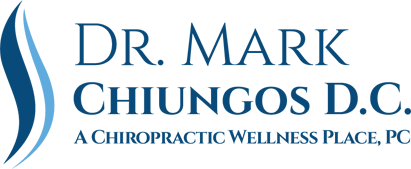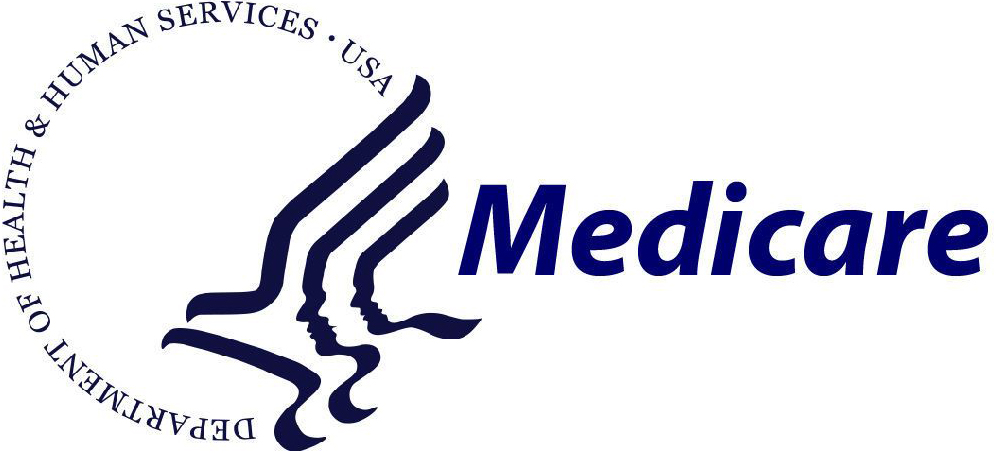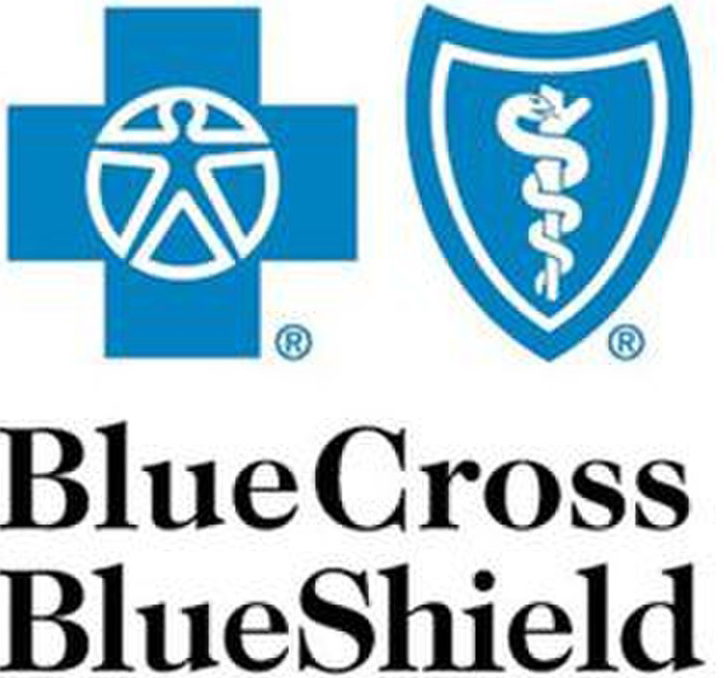Non-surgical Treatment For Disc Compression: Bulges, Herniation, Spinal Arthritis & Stenosis
What is Spinal Disc Decompression?
Your spine is made up of a series of 24 bones (vertebrae) separated by complex cartilage cushions called intervertebral discs. These discs do critical work in allowing your back to bend and stretch, and they protect the vertebrae from touching each other or the nerves coming out from your spinal cord. These nerves control your muscle function, all of your senses and even your organ functions.
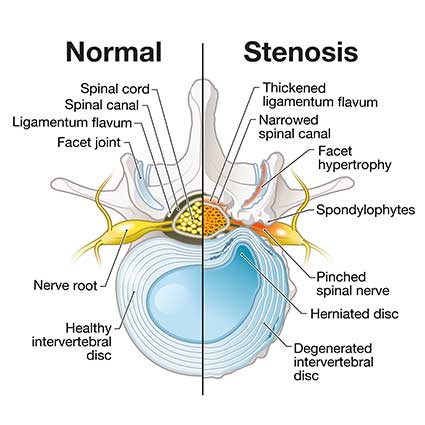
Damage to those intervertebral discs and nearby nerves can cause pain, numbness, weakness and loss of function. Untreated disc damage—and the resulting muscular spasms—seldom heals completely or properly as the discs are constantly under pressure during normal activities, and even while sleeping. The pressure prevents both water and nutrients from being absorbed by the disc from the vertebrae above and below—and waste products from being eliminated from the disc—preventing healing and causing progressive worsening of the condition. Oftentimes, this leads to severe degenerative disc disease and arthritis.
Damage in the spine can have far-reaching consequences—that is, all the way down to your legs and feet, or down your arms into your hands, or upward into your neck and head. Severe and debilitating pain in any or all of these areas can sometimes lead patients to invasive and risky surgery. At A Chiropractic Wellness Place, we’re proud to offer the state-of-the-art non-surgical SpineMED® decompression system, an exciting advancement in the treatment of intervertebral disc disease.
SpineMED® Decompression – Available Now In Chelmsford, MA
At A Chiropractic Wellness Place, we’re proud to offer the state-of-the-art non-surgical SpineMED® decompression system, an exciting advancement in the treatment of symptoms of intervertebral disc disease: bulging, herniated discs, arthritis and stenosis.
The SpineMED® Procedure
SpineMED® is designed to reduce the pressure in the discs through targeting the damaged areas and carefully positioning your body in a way that allows the compressed disc to relax. The reduction of pressure allows more necessary fluid to move back and forth in the disc, bringing nutrients and oxygen and eliminating toxic wastes. This will assist the body’s natural rebuilding process. The decompression process speeds up the natural repair process for damaged spinal discs.
Is SpineMED® Therapy For Me?
SpineMed is designed to help the healing of disc-related conditions, including bulging discs, herniated discs, disc degeneration, arthritis, and facet syndrome. In your first visit, Dr. Chiungos will review your history and any MRIs with you, including any conditions you are already aware of, to determine if disc problems are part of your pain.
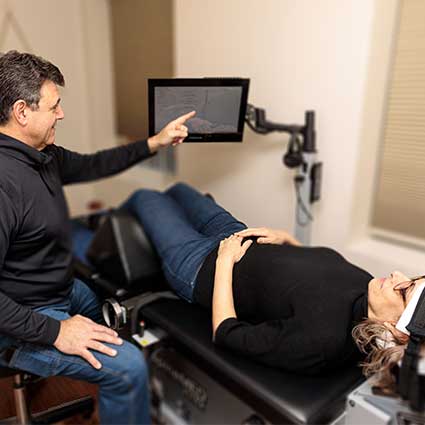
If you have previously had spinal surgery, you could still be a SpineMed candidate, as long as you do not have implanted hardware in your spine (such as mesh, screws, pins or rods). Patients who are not candidates for SpineMed are those with conditions that compromise the integrity of the spinal column, such as Gross Osteoporosis, Spondylolisthesis grade 2 and above, fractures, tumors, or congenital pars defects.
Minimum age for SpineMED® procedures is 12 years. Maximum age will be determined by Dr. Chiungos, based on your health and physical condition.
What to Expect
In a typical 30-minute session, you will lie (fully clothed), on the table, with your body secured comfortably at the pelvis and upper torso or head. The computerized system will control the tilt of the table or cervical cradle to target specific spinal segments. With precise and pain-free computer-controlled tension, the specific disc segment will be gently decompressed. The process is so comfortable, it is not uncommon for patients to fall asleep!
The average recommended course of treatment is 20 to 30 sessions over 30 to 60 days. We recommend that patients avoid long periods of sitting or engaging in athletic activity as a majority of the healing takes place during this period. Ideally, the sessions are performed daily with rest on the weekend.
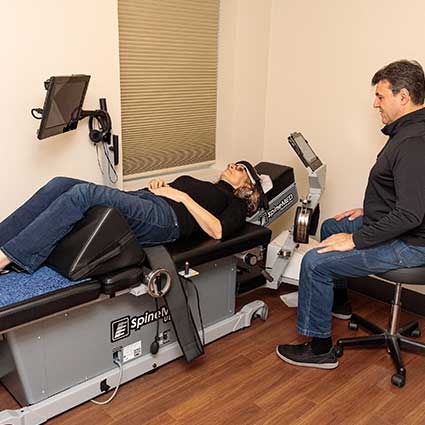
Frequently Asked Questions
Will my insurance cover decompression treatment?
Decompression treatment is not currently covered by health insurance. If Dr. Chiungos believes this is an integral part of your treatment plan, he will discuss all costs and potential discounts before the start of care. You will receive informed consent.
Is spinal decompression therapy safe?
Spinal Disc Decompression with the SpineMED® Table has shown to be safe and generally without major side effects or complications once abnormal conditions have been ruled out. The process is so safe and comfortable, it’s not uncommon for patients to fall asleep!
Are there any situations that are unsafe for spinal decompression?
Specific situations that are not suited for decompression therapy include:
- Patients under 12 years old
- If you had spinal surgery that involved clips, mesh or fusion
- If you have fractures, tumors or infections
- If you have osteoporosis or spondylolisthesis where there’s been a fracture or non-union defect in the spine, where that segment that we want to traction is unstable
How does spinal decompression complement traditional chiropractic?
Damaged intervertebral discs seldom heal as the discs are constantly under pressure from muscular spasm—during normal activities, and even while sleeping! SpineMED is designed to reduce the pressure in the discs, promoting the influx of vital fluids, nutrients and oxygen back into the discs to assist the body’s natural rebuilding process. This process may speed up the natural repair and could eventually heal damaged spinal discs.
How long will decompression therapy take?
Sessions are typically 30 minutes long. It could take 15 to 25 sessions or more to see some relief from your discomfort. That’s variable based on your status and the condition we’re treating. Ideally, the sessions are performed daily with rest on the weekend.
SpineMED® FAQ
Sessions are typically 30 minutes long. It could take 15 to 25 sessions or more to see some relief from your discomfort. That’s variable based on your status and the condition we’re treating. Ideally, the sessions are performed daily with rest on the weekend.
Damaged intervertebral discs seldom heal as the discs are constantly under pressure from muscular spasm—during normal activities, and even while sleeping! SpineMED is designed to reduce the pressure in the discs, promoting the influx of vital fluids, nutrients and oxygen back into the discs to assist the body’s natural rebuilding process. This process may speed up the natural repair and could eventually heal damaged spinal discs.
- Patients under 12 years old
- If you had spinal surgery that involved clips, mesh or fusion
- If you have fractures, tumors or infections
- If you have osteoporosis or spondylolisthesis where there’s been a fracture or non-union defect in the spine, where that segment that we want to traction is unstable
Spinal Disc Decompression with the SpineMED® Table has shown to be safe and generally without major side effects or complications once abnormal conditions have been ruled out. The process is so safe and comfortable, it’s not uncommon for patients to fall asleep!
Decompression treatment is not currently covered by health insurance. If Dr. Chiungos believes this is an integral part of your treatment plan, he will discuss all costs and potential discounts before the start of care. You will receive informed consent.
